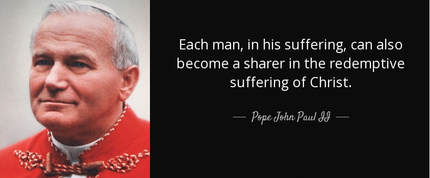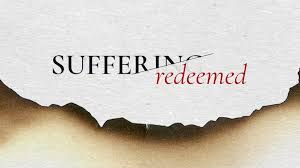
“Now if we are children, then we are heirs—heirs of God and co-heirs with Christ, if indeed we share in his sufferings in order that we may also share in his glory.” (Romans 8:17)
“Christ does not explain in the abstract the reasons for suffering, but before all else he says: “Follow me!”. Come! Take part through your suffering in this work of saving the world, a salvation achieved through my suffering! Through my Cross. Gradually, as the individual takes up his cross, spiritually uniting himself to the Cross of Christ, the salvific meaning of suffering is revealed before him” (Apostolic Letter, Salvifici Doloris, 26, by Pope John Paul II)
There is in the Catechism of the Catholic Church a remarkable paragraph that speaks to the amazing power God has given us, by our prayers and good actions, to merit most amazing graces for others. If the paragraph in question is sound theology, as we know it must be, then it would be good for us to take advantage of this spiritual solidarity and use God’s grace to merit good for others! Here is that paragraph from the Catechism:
2010 “Since the initiative belongs to God in the order of grace, no one can merit the initial grace of forgiveness and justification, at the beginning of conversion. Moved by the Holy Spirit and by charity, we can then merit for ourselves and for others the graces needed for our sanctification, for the increase of grace and charity, and for the attainment of eternal life. Even temporal goods like health and friendship can be merited in accordance with God’s wisdom. These graces and goods are the object of Christian prayer. Prayer attends to the grace we need for meritorious actions.” (See also CCC 307, 618, 953, 956, and 1508)
Now in Saint Paul we see a clear Biblical basis for this Catholic doctrine of meriting good for others with specific reference to the concept or doctrine of redemptive suffering. I am especially going to take a look at two striking passages – one from Paul’s Letter to the Philippians, and the other from his Letter to the Colossians (using the Living Letters translation, which is a simplified/paraphrased translation recommended by Billy Graham, which can easily be compared to traditional translations).
PHILIPPIANS At 2 Philippians 2: 17-18 Saint Paul discusses the possibility of offering his life as an oblation for the community. Here is what he says:
“And if my lifeblood is, so to speak, to be poured out over your faith which I am offering up to God as a sacrifice — that is, if I am to die for you – even then I will be glad, and will share my joy with each of you. For you should be happy about this too and rejoice with me for having this privilege of dying for you.”
COLOSSIANS And at Colossians 1:24 Saint Paul says to the community there:
“But part of my work is to suffer for you; and I am glad, for I am helping to finish up the remainder of Christ’s sufferings for his body, the church.”
We can see, therefore, from the passages cited above, that at Calvary Christ merited for members of his mystical body the privilege of joining in His super-abundant, all-encompassing suffering for the benefit of others.
Paul’s understanding of redemptive suffering flows from his insight that believers in Christ form one organism, or one body, united to Christ who is the head (“all of us, in union with Christ, form one body” – Romans 12: 5). Paul says elsewhere at 2 Corinthians 1: 5-6 (RSV):
“For as we share abundantly in Christ’s sufferings, so through Christ we share abundantly in comfort too. If we are afflicted, it is for your comfort and salvation….”
Still further at 2 Corinthians 4:8-12 Paul states:
“In all things we suffer tribulation: but are not distressed. We are straitened: but are not destitute. We suffer persecution: but are not forsaken. We are cast down: but we perish not. Always bearing about in our body the mortification of Jesus, that the life also of Jesus may be made manifest in our bodies. For we who live are always delivered unto death for Jesus’ sake: that the life also of Jesus may be made manifest in our mortal flesh. So then death worketh in us: but life in you.”
So in the Catholic church, following the teaching of Paul on the value of redemptive suffering, we are urged to unite our own suffering to the Cross of Christ for the welfare of others. Pope John Paul II made this point about the value of redemptive suffering in a trip he made to Poland, stating:
“Therefore, uniting myself with all of you who are suffering throughout the land of Poland, in your homes, in the hospitals, the clinics, the dispensaries, the sanatoria—wherever you may be—I beg you to make use of the cross that has become part of each one of you for salvation. I pray for you to have light and spiritual strength in your suffering, that you may not lose courage but may discover for yourselves the meaning of suffering and may be able to relieve others by prayer and sacrifice. And do not forget me and the whole of the Church, and the cause of the Gospel and peace that I am serving by Christ’s will. You who are weak and humanly incapable, be a source of strength for your brother and father who is at your side in prayer and heart.” (quote from Father Hardon)
And in her mystical life Saint Faustina, the “secretary of Divine Mercy,” experienced this revelation from Jesus:
“I saw the Lord Jesus nailed upon the cross amidst great torments. A soft moan issued from His heart. After some time He said “I thirst. I thirst for the salvation of souls. Help Me, My daughter, to save souls. Join your sufferings to My Passion and offer them to the heavenly Father for sinners.” (Diary 1032)
The old Catholic practice of making a “morning offering” of the trials and tribulations one suffers during the day, for one’s own benefit or for the benefit of others is, no doubt, based on strong Biblical foundations. Perhaps tomorrow you are going to find yourself, as someone once said, “nailed to your desk,” doing hours of paperwork that you would love to chuck out the window. In union with Jesus’ sacrifice on the Cross, and in union with all the masses being said throughout the world, you can offer up your hardships and daily duties for the benefit of some soul who desperately needs grace. Don’t waste your sufferings.
Tom Mulcahy, M.A.

